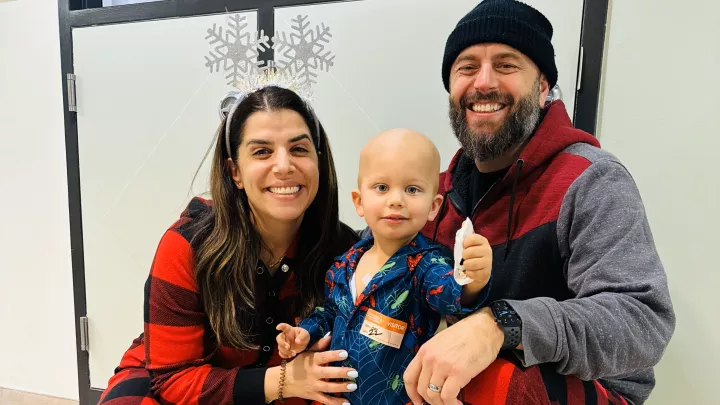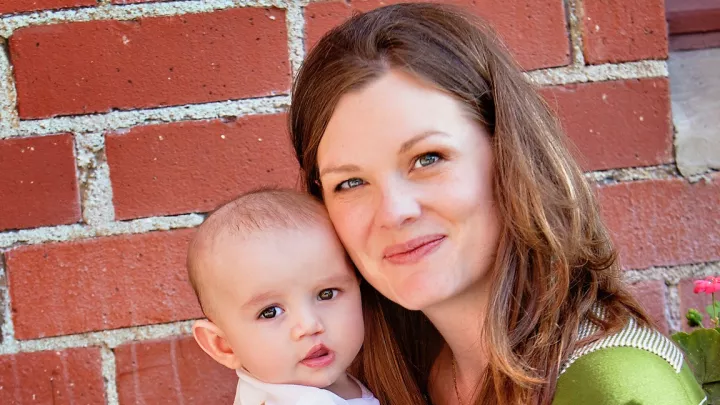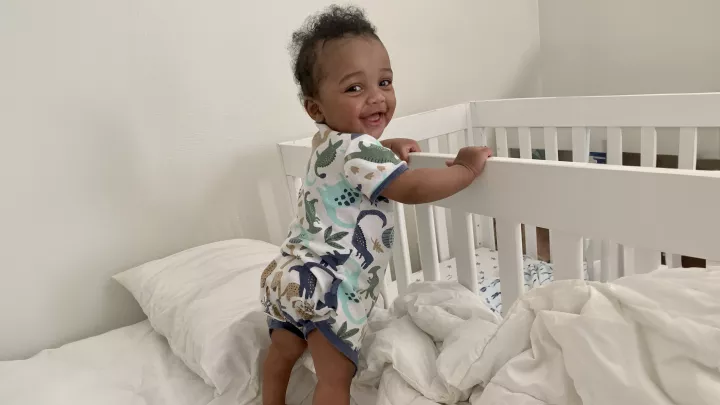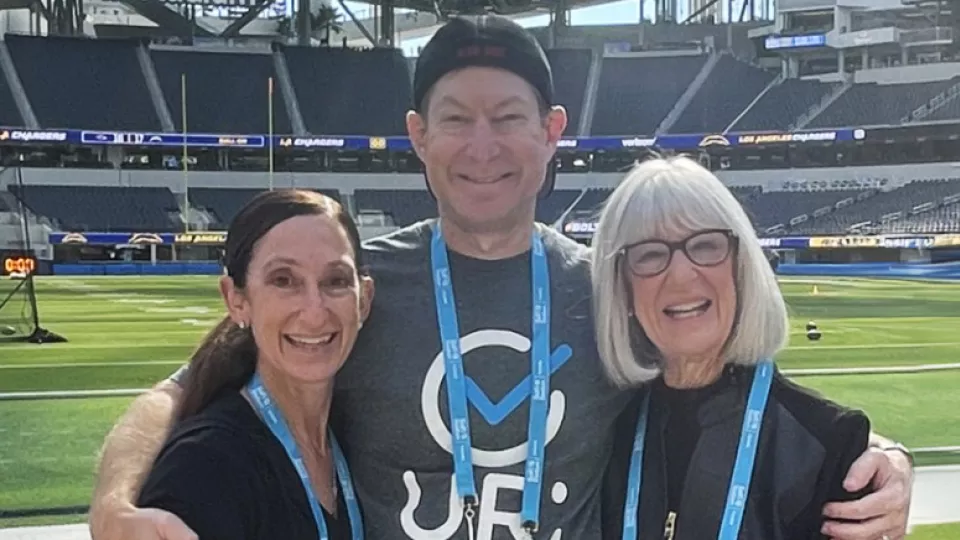
The family of the late Gary Krieger, MD (left to right): daughter Lori, son Jeffrey and wife Bunny
Celebrating 20 Years of the Krieger Pediatric Advocacy Award
Introduced in 2005, the Children’s Hospital Los Angeles Gary F. Krieger, MD, Pediatric Advocacy Award reached the 20-year mark this past spring. Totaling up the award’s impact, however, would compute to quite longer than that, since the benefits of each winning project continue well after the 12 months the award winner holds the title.
It's the perfect tribute to Dr. Krieger, as the award honors the lasting effect he had as an advocate for children’s health—which is what prompted his wife and two adult children to memorialize his life’s work after he passed away in 2001.
“We needed to do something,” his wife, Bunny, recalls. “We thought about developing a marathon or a race, and then the kids said, ‘But that wasn't Dad. We want to do something that was our father.’ And it always went back to something with Children’s Hospital.”
Dr. Krieger’s career as a pediatrician began with his residency at CHLA, before he went on to open a practice in San Pedro, California. “He was always very thankful that he trained at Children's,” Bunny says.
His work took him far outside his clinic. He traveled frequently to Sacramento and Washington, D.C., to advocate for pediatric issues statewide and nationally, representing major medical groups such as the California Medical Association and the American Medical Association.
“He was really out there, wanting great health care for kids no matter what nationality or income level,” says Dr. Krieger’s daughter, Lori Krieger, MD, who followed her father into pediatrics, and after training at CHLA from 1998-2001, took over his practice after his death. Her brother, Jeffrey Krieger, MD, is a gastroenterologist in Dallas.
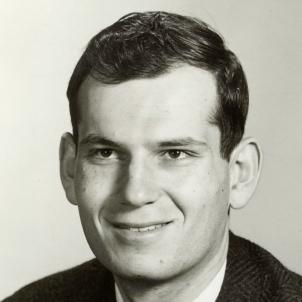
Lori credits Robert Adler, MD, MSEd, CHLA’s Vice Chair for Clinical in the Department of Pediatrics, with conceiving the award when he met with the family to brainstorm on how best to celebrate her father. It was a perfect convergence of goals. Dr. Krieger was a devoted health care advocate, and Dr. Adler had begun incorporating advocacy requirements into the curriculum of the Pediatric Residency Program, which at the time he managed in his role as Designated Institutional Officer, overseeing all the training programs at CHLA.
They arrived at an award given out annually to the resident who submits the advocacy project deemed most worthy of funding.
“Dr. Adler jumped in and said, ‘We can make this part of the advocacy program at Children's Hospital Los Angeles,’” Lori says, “and we said, ‘Great, let's roll with it.’”
How a winner is chosen
The award’s emphasis on advocacy was a pacesetter, says Dr. Adler, the Roberta G. Williams, MD, Chair in Pediatrics at CHLA. He explains that the training of pediatric residents used to focus solely on direct patient care within the walls of the clinic. Today, the Accreditation Council for Graduate Medical Education (ACGME), which accredits physician training programs in the U.S., has established standards that insist young pediatricians demonstrate leadership and advocacy while understanding and attempting to fulfill community needs.
“Bunny and her family realized the importance of advocacy training before it was even required by the ACGME,” Dr. Adler says. “The importance of not only being outstanding pediatricians, but also advocating for pediatric patients and families beyond the orders of their office, modeled what Gary Krieger did in his life.”
Advocacy is now entrenched in CHLA’s training curriculum, as it is one of the required rotations every resident must take. Residents will commonly travel to Sacramento to visit state lawmakers to advocate for various bills and issues of importance to pediatric care.
“Advocacy has become a core requirement,” Dr. Adler says, noting that some residents choose to make it the central part of their training by taking an advocacy “track.”
Applicants for the award must submit a proposal that outlines how they would pursue their project over one year’s time. Candidates describe the project, the importance of it, how they’re going to carry it out, what they believe its impact will be, and how that potential impact is sustainable. And lastly, they have to explain how they would stay within a budget of $3,000—the amount of the award, funded entirely by the Krieger family.

“They have to explain pretty meticulously how they would use the money,” Dr. Adler says. “And then they have to carry out the work."
The family gathers with Dr. Adler to go through the submissions, eventually agreeing on a winner, who is announced at CHLA’s Grand Rounds event in the spring after the previous winner has presented the outcomes from their year-long project.
Lori says there’s nothing obscure in what the group looks for in a winning submission. “It’s pretty simple: just a well-thought-out project with a wonderful purpose that reaches out to the community. How is this project going to have an impact down the road?”
The 2024 winner was first-year resident Xhesika Begaj, MD, who proposed creating a tool pediatricians can use to screen their patients for eating disorders, an upgrade from the template of questions doctors now ask patients in the effort to uncover an eating disorder. Her aim is to identify patients with eating disorders earlier and more often—“to make sure that when these habits arise, doctors can pick them up and address them as soon as possible before it gets out of control,” Dr. Begaj says.
She hopes the project achieves sustainability, a main criteria of the award. “Ideally the screening tool would outlast the project, especially if after we look at the data we see that more patients are being screened and identified as having eating disorders.”
Carrying on a legacy
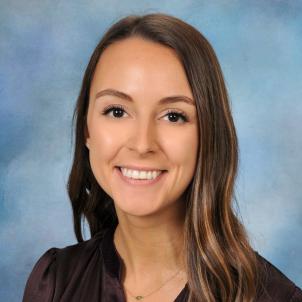
Over the years, Dr. Adler says, the winning projects have provided avenues for getting help to areas that need it. “It's really been a nice way to focus on what we think are the most important issues that should be addressed.”
One winner he recalls immediately was last year’s, developed by a resident who wanted to tackle the opioid crisis among U.S. teens by increasing the availability of the intranasal spray naloxone (brand name Narcan)—an opioid-reversal agent—in the CHLA Emergency Department, to avert deaths from accidental overdose.
“Not only was the project timely, it took on a gap in coverage for teenage patients,” Dr. Adler says. “The emphasis has been so much on addressing this issue in adult emergency rooms that pediatric emergency rooms haven’t been included.”
Lori says the Krieger Pediatric Advocacy Award has fulfilled its greatest intention—to carry on her father’s advocacy work on behalf of children’s health.
“He was out there making sure there was good and equal health care for all children,” she says. “To be able now, in our small way, to say, ‘All right, let's keep that going’ is so fulfilling. To hear these projects and to know that, absolutely, there are young physicians who have the drive to advocate to improve kids' lives is so powerful.”
